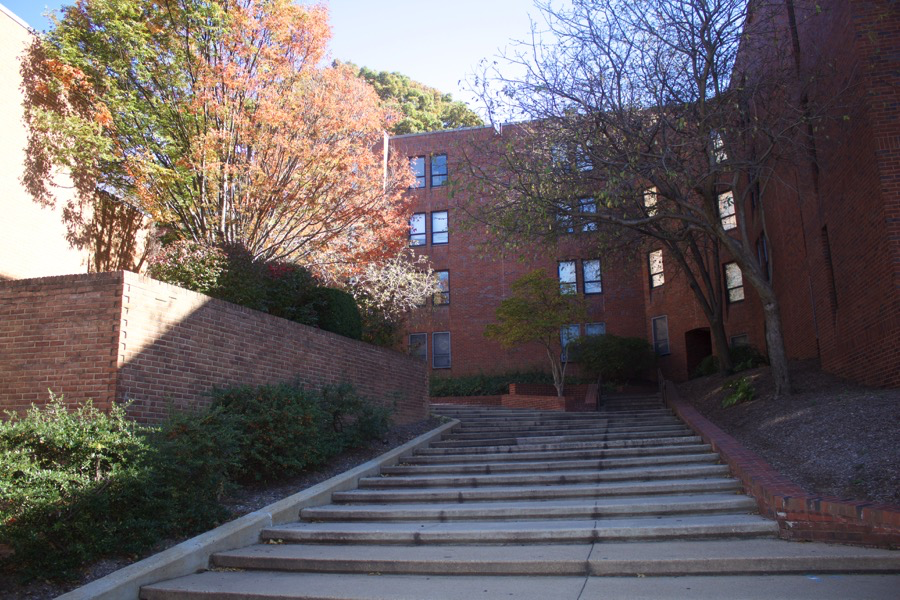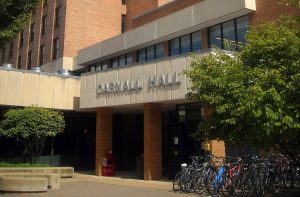This semester, Georgetown’s housing problems came to a head when one top-floor Village B unit’s ceiling caved in. This prompted the university to inspect the entire complex’s roof. Out of what the university administration called an “abundance of caution,” all 85 top-floor Village B residents had to move out of their apartments and into the Leavey Center hotel.
This editorial board commends Georgetown for its action to move students to safe housing and for fairly compensating the affected students. Still, the university’s housing system is plagued by deferred maintenance, and students’ frustrations are justified. To address the problems, the university has promised to spend some $75 million over the next five years to improve facilities across campus. We hope the university follows through on its commitment and that it makes permanent the increased spending on deferred maintenance and student housing.
In 2016, several outdoor metal chairs disappeared from Henle Village. University officials sent an email to Henle residents demanding that the chairs be returned and threatened to charge the entire community for replacements. Holding a group responsible for isolated misdeeds was the wrong way to handle the situation, but we are also concerned with the cost of the chairs, and what it represents. The chairs, Henle residents were told, cost about $500 each.
This episode raises a pressing question: What are Georgetown’s housing priorities? Housing on campus, though not generally a direct danger to students, suffers from a pileup of deferred maintenance, and this incident makes us wonder whether the $75 million will actually be spent on the university’s most urgent housing needs.
Cosmetic renovations—no matter their ability to impress prospective students and donors—must take a back seat to structural and health concerns. Therefore, we call on the university to take a radically open and transparent approach to addressing the housing problems on campus.
Contracts with construction companies and other vendors should be made available to the public. The costs of the projects and the tradeoffs inherent in them—such as cost versus quality—should be subject to student and press scrutiny. At a time when tuition and housing costs exceed the average American family’s entire annual income, affordability must be among the university’s top priorities. And to the extent that the university must charge students such enormous sums, it should justify every cent.
The new housing spending presents an opportunity to adopt new habits. Seventy-five million dollars is a good start, but top administration officials need to take responsibility for the fact that an apartment roof was allowed to deteriorate to the point that it collapsed into students’ living spaces. Students deserve to know what went wrong—on an institutional and technical level—and what will be done to prevent it from happening again. The university must be held accountable to ensure ceilings never collapse again and to guarantee that money is spent on basic improvements before fancy upgrades.
The university’s decision to allocate more funding toward fixing campus housing is the right one. We are grateful to those who will do the work to implement the changes, from administrators to contract workers to facilities staff. Nonetheless, we are concerned that the money will not be spent wisely. Georgetown’s housing needs major upgrades, and the university is in a position to provide them. But as the university spends its money, we are asking for a few promises.
First: No more ceilings at risk of collapse, and no more mold infestations allowed to fester. The university must address health and safety risks first before it contemplates cosmetic improvements.
Second: Students do not need $500 chairs, especially when such expensive things contribute to the exorbitant cost of attendance. Even if the university was able to justify such expensive furniture, it should have made its justification public. More seriously, the university’s spending must prioritize value and necessity.
Third: The university must prove its commitment to affordability and publicly release the information required for a skeptical third party to verify its frugality and the soundness of its financial decisions, especially regarding housing.
Continued unaccountable spending should draw student frustration. But students must be intelligent, measured advocates. Student complaints about lingering mold or unstable ceilings are well-founded, and the students who raise them are often well informed. After all, it does not take much expertise to know that mold, collapsing ceilings, and $500 chairs are problems in need of a solution.







